
Over the last 18 years, I’ve been journeying with the help of the Enneagram – although I would say I’ve taken it more seriously over the last 6-8 years. I have found it to be utterly transformational in how I understand myself and how I can become my best self. I would recommend it to anyone and everyone – it is honestly the best tool I have ever found for personal/spiritual development, and how to live well in human relationships. The hard reality is this – if we don’t do our (inner) work, we will never change. I think it’s also true that understanding our own personality type and those of other people allows us to be much more focused in therapeutic and medical interventions. I hope this blog helps us to get to some of the root issues in our personality types that can cause us to sabotage ourselves then it comes to living well in our bodies.
Your Personality Type
I have personally found the Enneagram an incredibly helpful framework for understanding how the the human personality develops and why we behave and think in the ways that we do. The teaching is ancient and sacred and I am certainly no expert. There is absolutely no way that I can even begin to do justice to this wisdom in such a short blog, (although it is something I will continue to explore in future posts and podcasts), but I hope some of my personal reflections on what I am learning may be helpful by way of introduction. In short, the wisdom of the Enneagram teaches that there are 9 basic personality types or ‘ego-projections’. In response to encountering the environment around us as we grow, our personality develops around our deepest unmet needs and root struggles/’sins’. This is our ‘false-self’. If we are not awake to who we are and how we function in the world then we will not understand why we continue to behave in certain ways and trip up over the same issues again and again. The gift of the Enneagram is that it doesn’t define who we are are and what we will be. It helps explain why we’re stuck in the box we are in and helps us break out of it, so that we can be become more fully who we really are. Over time, as we develop and do our work, we are less obviously one number or another and begin to become more whole. The Enneagram invites us to surrender ourselves (to God, as Richard Rohr clarifies) and let go of the need to keep up the pretence of the ‘false-self’ we have created to protect us and/or impress others and instead to become our true selves and a true gift to others.
There are two main traditions within the Enneagram teaching. they have some similarities and some differences in their understanding and application of The Enneagram:
Enneagram Worldwide (which is what I know more of) and The Enneagram Institute. Their websites are great resources:
https://www.enneagramworldwide.com/
https://www.enneagraminstitute.com/
If you’re interested, I would recommend any of these following books:
The Enneagram Made Easy – Renee Baron & Elizabeth Wagele
The Road Back to You – Ian Morgan Cron & Suzanne Stabile
The Essential Enneagram – David N Daniels & Virginia Ann Price
The Enneagram – A Christian Perspective – Fr Richard Rohr & Andreas Ebert
The Wisdom of the Enneagram -Don Richard Riso & Russ Hudson
The Sacred Enneagram – Christopher L. Heuertz
The Enneagram of Belonging – Christopher L. Heuertz
If you prefer podcasts, these ones are helpful:
The Enneagram Journey with Suzanne Stabile
If this is something you decide to explore I would REALLY recommend that you don’t take an online test. Read or listen to some stuff first – take notice of your responses to the various types. There will probably be two or three types that you might associate with, after you’ve got your head around some of the basics. Read/listen around those types first and THEN take a test or two, if you’re still not sure. I really like what Richard Rohr says when he mentions that the type that you most react to may well be the type that you are! Often it is uncomfortable for someone to hold a mirror up to us.
Let me just offer some brief insights on each type to whet your taste buds and see if this might be something that helps you, or alternatively, stop reading here and either buy the books or disengage with this idea completely! I am particularly grateful to my incredible Enneagram coach/therapist/friend/spiritual mentor, Paul Wood for helping me in my own understanding and growth.
Before we delve into the nine ‘types’, it’s worth saying a quick word about the three triads and the three sub-types!
Each of the Enneagram types is divided into groups of three. The head types: – fives, sixes and sevens; the heart types: – twos, threes and fours; and the body types: – eights, nines and ones. As a doctor, I am fascinated by disease and although I haven’t seen any research into this yet, I think it would a fascinating area of research to understand how the various types affect physical health conditions. There are definite links with certain mental health conditions and some personality types are more prone to develop certain ‘personality disorders’. Perhaps more on this another time!
The Enneagram also teaches that for each of the 9 personality types, there are wings and also 3 sub-types – social, sexual and self-preserving. For those of you who know the Enneagram, I’m not even going near the wings in this blog! The sub-types though, are pretty important because they can make people of the same type behave pretty differently.
Each of us has one dominant sub-type, one secondary sub-type and one ‘blind-spot’. One of these best ways to think about it is this: if you walk into a room full of people, with a buffet on one side of the room, what do you do (other than walk straight back out again – type 5!?!)? If you work the room and like to make lots of contact with people, you’re likely a social sub-type. If you make a beeline for the buffet whilst checking out where the exits are and ensuring you stand in a place where you will feel most safe, then you are likely a self-preserving sub-type. If you are trying to work out who the most interesting person in the room is, with whom you could have a really in depth and personal conversation, then you’re likely a sexual sub-type. I, for example, am a social sub-type, with a secondary sub-type of ‘sexual’ (or I prefer the term one-to-one), but my blind spot is ‘self-preservation’. What that means is that I love to have lots of company, go to lots of gatherings, usually where there is lots of food, with which I tend to overindulge (out of politeness, of course), and I have a great time working the room and can also get absorbed in some really interesting and deep conversations, but I can very easily forget to think about my own needs – so I over eat, rather than recognising when I’m full and I stay out late, when actually I could do with an early night etc. Needless to say, these sub-types have a huge bearing on how we respond within our individual types.
Type 1 – The Perfectionist/The Improver/The Reformer

As children, Type Ones tend to see the world as being pretty perfect and are ‘good children’. Their inner desire is to be able to play and enjoy life. But they begin to realise that life is not perfect. In fact the world is very imperfect, damaged, flawed and spoiled by all kinds of things over which they have no control. They have a need for things to be perfect. However, in their failed efforts to make happiness happen they develop a deep sense of anger (their root sin/stumbling stone) because their need is unmet. But they don’t want to project this to the rest of the world around them, because they are ‘good’. So they develop an ego projection to world that they are ‘reasonable’ – and this leads to rigid self-control. This then causes some pretty unhealthy behaviours, both for themselves and towards others, which are particularly hard to admit to and face up to. These include being self-absorbed, emotionally reactive, controlling, unhelpfully perfectionist, critical and actually deeply resentful of the world around them that isn’t the way it should be.
The invitation for all types is to face up to their deepest stumbling stones/sin and this is a really hard thing to do. It sounds brutal, but the invitation for the One is this: to admit that they are actually deeply rebellious and selfish. To stop their judging of others and to stop their unkind self-critique. If they do this, they make room in themselves for irrationality and messiness. When this happens it allows them walk into and receive the grace of an inherent sense of joy and lightness in simply ‘being’ and to find a real integrity between the inner experience and the outer expression. They come into a place of integration where they let go of the anger, so that it no longer controls them and find their inherent goodness allows them to experience life in its fullness and truth. When Ones step out of their ‘ego-structure’ and into ‘gift’ they become incredible leaders. They inspire and instil a sense of goodness. They make a difference in issues of social justice because they know that the world can and should be better than it is right now. They bring change to society through encouraging others to be their best selves and make fantastic coaches and communicators.
Type 2 – The Helper/The Giver/The Server
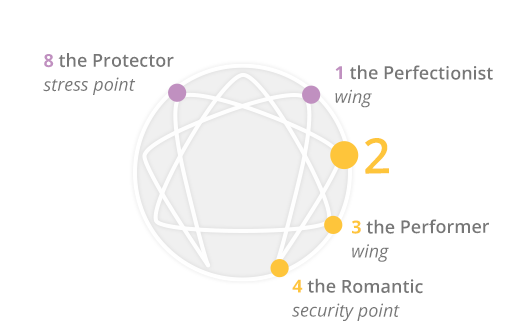
As children, Type Twos deeply long to connect to others. They would struggle to admit it, but at the root of their problems is the reality that they struggled to get the attention they craved or felt like they deserved. They lack a sense of inner peace that they are deeply and unconditionally loved. So, in a bid to get noticed, they develop a need to be needed by others and start to believe that people will not be able to cope without them, which leads to their stumbling stone/root sin of pride. This leads to the development of their ego projection to the world that they are loving and helpful people. To others it seems like they are reaching out and connecting, always giving of themselves. But deep down this is what the Two craves – the acknowledgement that they are kind, helpful and giving of themselves. But what is really happening (and it’s hard for two to face up to this) is a need to dominate and control others with this attention, which they need in order to fill their inner void.
The invitation for a two then, is to admit to the negative feelings they have towards others (and themselves) and to allow their own needs to be important and to be met. In doing this, twos discover and receive the grace that the are deeply and inherently loved and accepted. Not for what they do, not for how they help, but simply for who they are. This allows them to stop being shaped by their need and become truly loving out of a place of knowing that they, themselves, are loved. In their best selves, they become full of strength, vitality and bring a gift of true mercy. They bring deep comfort and empathy to the people and communities around them. They are incredible ‘servant leaders’, no longer worried about getting the attention themselves but able to pour out their love for others, knowing that they are filled from a different source altogether.
Type 3 – The Achiever/The Performer
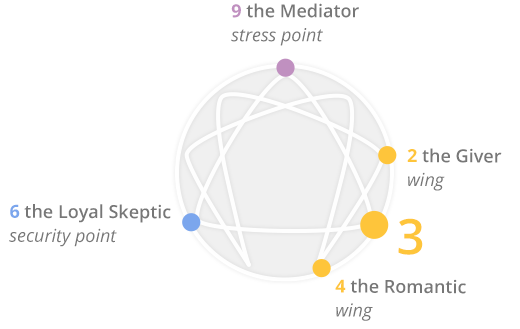
As children, Type Threes realise that they are vulnerable and they begin to worry about what might happen to them, if people discovered what they were really like. So, through self-effort and self-creation, they become like a demi-god and create an ego projection to the world that they are outstanding. They develop the remarkable ability to play exactly the right part in whatever setting they encounter, because they have a deep need to be successful – but in doing so, they let go of their true self and so fall into their ‘sin’ of deceit. In fact, they can wear so many masks that it’s difficult for them to know their own true self. This leads to them seeking external validation to gain their sense of worth. However, what this leads to (over production, being over stressed, self-neglecting and disengaged from reality) is the exact opposite of what they crave.
The invitation for a Three therefore is to allow themselves to admit to their own anxiety and self-doubt. These self-made individuals are often racked with insecurity. When they stop and acknowledge this, they can relax into their own skin and stop needing to perform. For a three this is most often possible when they fail or when something happens which means they can’t perform for a while. When this happens, they can discover and receive the grace that being is enough – the place of true faith and they become grounded in belovedness. It doesn’t mean they stop achieving – it means that they learn to operate out of a sense of knowing who they truly are through an ‘internal’/deeper sense of affirmation, rather than the need for this to come externally. Healed Threes recognise failure as a gift. They are able to let go of the need to excel to win and become simply excellent! They make wonderful leaders and bring a sense of drive, and achievement to the teams they work in and with. Threes don’t just see the vision, they deliver it.
Type Four – The Romantic/The Individualist
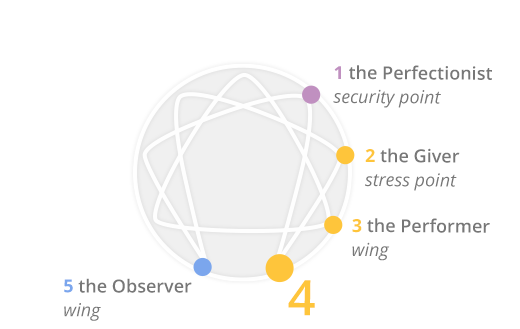
As children, Type Fours have a sense of lack or real/perceived suffering. They carry a deep sense of being somehow tragically defective in some way and ‘cast out’ or like they are a misfit, who noone can quite understand and so they develop a kind of longing to be rescued. This creates a sense of comparison and others and leads them to their root sin/stumbling stone of ‘envy‘. So they create an ego projection to the world around them that they are sensitive, which pulls people towards them because they are ‘mysterious’ and feel things deeply. They have a need to be special. But this can lead to them being experienced as emotionally reactive and unpredictable. And this is used by the four (unconsciously) to control and manipulate relationships.
The invitation for the Four then is to admit to themselves and others that they are judgemental, envious and critical of others. They then have to risk letting go of their inner identity building in opposition to others and instead receive, in place of their felt sense of deficiency, the grace of an identity of ‘inherent and fundamental goodness’. This integrates with a sweetness and generosity of Spirit and allows the Four to bring an incredibly gift of beauty, artistry and creativity to the world around them. Fours make the world beautiful. They carry incredible creativity and wonder. They are incredibly emotionally perceptive and intelligent and pick up on ‘atmospheres’ and under currents. They are true empaths – sensitive, loving and at their best able to hold space for others to do their own work, without taking it on themselves.
Type 5 – The Observer/The Investigator
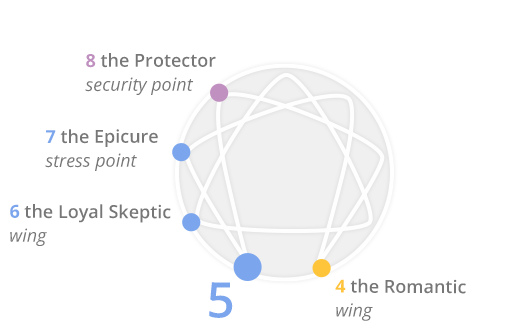
As children, Type Fives have a desire to assert themselves and take control of their world. But they find that the world fails to satisfy their inner emptiness. So they disengage and become more withdrawn (it’s quite rare though not impossible to be a Five AND an Extrovert!). Fives withdraw into their minds, because that is where it feels safe and they stumble over their root sin/stumbling stone of Avarice/Greed. This can be greed for ideas, but can be material accumulation also – Mr Microsoft is a classic Type Five. Fives develop a deep need to perceive. It is through their superior knowledge base that they can control their surroundings and gain an inner sense of superiority. So their ego-projection to the world is that they are perceptive and wise. This leads to some classic behavioural traits of withdrawing into their minds to ‘figure things out’. But this can lead to them being quite absent, distracted and have a hyperactivity of their mind – unable to ‘get out of their head’. One thing that can happen to a Five is that because they spend so much time in their head, they forget to listen to what their body needs because to them, what really matters is their mind, their thoughts, their ideas.
The invitation to a Five then is to admit to themselves and others that they use knowledge to dominate and undermine others. They then need to risk getting in touch with their heart and allow themselves to feel things more deeply. When they do this, they allow themselves to stop being so standoffish, to receive the grace of real self-confidence and find they can get involved in community and society rather than observing it from their ivory tower, firing sarcasm from a safe distance. When this happens they can also integrate with a deep sense of joy and lightness of being, bringing much more earthed wisdom and understanding into the world around them. Fives bring incredible wisdom and understanding to society. They are well read, able to dig deeply into complex ideas and make it available to the rest of us. Fives care about detail and this is important. They also bring a reality check with a sense of humility to problem solving.
Type 6 – The Loyal Sceptic/The Patriot/The Loyalist
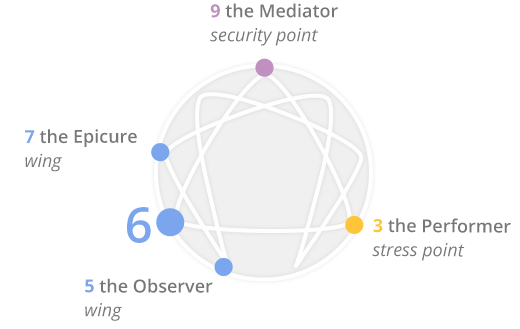
Most Enneagram teachers believe that Type 6 is the most common Type – according to Richard Rohr, perhaps up to half the population might be Type Sixes. As children, sixes have a deep desire to be comfortable and for nothing to need to trouble or worry them. But they realise that the world is not altogether safe – it is random. This leads to a deep and existential sense of fear, which becomes their stumbling stone/root sin. As a result they develop an anxious alertness and believe in the idea of survival of the fittest. They therefore develop an ego projection which is that they are reliable, they are loyal and also sceptical. This leads to them seeking security externally. They can come across as true patriots – often looking for a leader who will make them feel safe – perhaps this is why in a time of uncertainty, political rhetoric around securing our borders and making our nation-states great again (Brexit/USA narrative) lands with so many voters. As a result of wanting to preserve this image of obedience and loyalty, Type-Sixes can easily become workaholic and expedient through are also quite image conscious because they worry a lot about what others think of them.
The invitation for a Six then is admit to themselves and others their deep need for security and comfort. Once they have done this, they need to risk quietening their minds, their anxious ruminations, their worries and their constant catastrophising of the future and instead learn to be still. When they do this, they will learn to receive the grace to be relaxed and trust in ‘Being’, knowing their inherent value. In this way and from this place of mindfulness, heartfulness and being present in the moment, they become truly loyal, faithful friends and can accomplish many great things with a sense of deep peace. Sixes make brilliant strategists. They see things very holistically. They consider the possible humps and hurdles on the road in front and are able to plan to mitigate these issues ahead of time. They ask good questions, see things from lots of different angles and perspectives and bring a much needed sense of realism to their work.
Type 7 – The Enthusiast/The Epicure
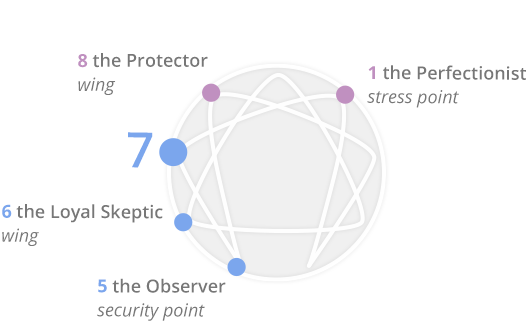
OK – full disclosure – this is my ego-structure!
As children, Sevens develop a sense of lack – that there might not be enough and feel overwhelmed by a build-up of issues. They respond to a sense that the world, or those around them have failed to make them feel content or safe. So, in search of ‘paradise lost’, they escape their sense of or fear of deprivation by drowning out any pain with pleasure. This leads to their root sin of gluttony – of food, or anything really – a false comfort, so they don’t have to face the reality of the pain they are feeling deep down. They develop a deep need to avoid pain, almost at any cost. So they project to the world that they are enthusiastic. Sevens can be huge fun to be around. However, much of this is ‘fake joy’ based in anticipatory energy of the next brilliant thing that’s about to happen rather than being present in the moment. As a result Sevens can become highly controlling of themselves and their environment in order to suppress the truth of what they are feeling. They want it to be fun! But this can be exhausting…..
The invitation for the Seven, therefore, is to admit to themselves and others that they really are overwhelmed and face the reality of the pain they are running away from. When they do this they recognise their deep dissatisfaction with life as it is and can learn the grace of contentment. When this happens they can receive the grace of discovering simplicity and a restored ability to focus. When they integrate this with a sense of things being OK just as they are without a constant need for more, then they can bring real, deep and lasting joy to the community and world around them. Sevens bring real deep, sober joy and gratitude to the world. They are enthusiastic and effusive, never lacking in vision or hope. Life is to be celebrated and Sevens love to party. They have an ability to assimilate lots of different perspectives and communicate in a way that galvanises people into action.
Type 8 – The Challenger/The Protector/The Leader

As children Eights have a deep desire to be held and loved, but they experience a real or perceived failure of others to love them as they need. This leads to them feeling let down. So they become determined to never be needy of dependent on anyone else ever again. They live to believe that they are in control and if they need something, they will get it for themselves. This causes them to stumble into their root sin of lust. Lust for power, lust for control, lust to dominate others. And so they project an ego to the world that they are strong. And as a result they have a need to be against. Against the expected status quo. Against the flow. Against the societal norms. This leads to assertive behaviours to demonstrate their strength and fierce ability to cope. But in doing so they become completely detached from their own needs. This can drive others away, and can be experienced as bullying – the exact opposite of what Eights actually crave, which is relational intimacy.
Difficult though it may be, the invitation for the Eight, therefore, is to let their guard down. To admit to themselves and others that they have weaknesses and unmet needs. And if they can risk openness or vulnerability with others then they will receive the grace of the experience of being truly loved. When they integrate this with deep clarity, insight and perception they bring true strength to the world and their desire for social justice, rather than burning them out, can come to the fore as a true gift. Healed eights make brilliant leaders. they look after their teams They carry a deep sense of social justice and they are not afraid to upset the apple cart to achieve this. They both challenge and inspire people to do the stuff that matters and live their best life.
Type 9 – The Peacemaker/The Mediator
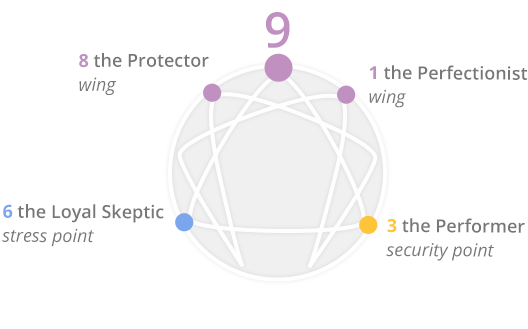
As children, Nines have a sense that they want to be someone special and get noticed. However, they somehow come to believe that this will only happen if they make it happen by themselves. Not so keen on this idea, they fall over their stumbling stone or into their root sin of sloth or laziness. As a result, they become self-forgetting, zone out from the world, function on autopilot and tune out from the depths of life and project their ego onto the world that they are peaceful, easy-going and will fit in with anything. In so doing they lose themselves. But as they have developed a need to avoid, they don’t mind too much, as long as they feel comfortable. This leads to them becoming both anxious and passive, but when challenged can aggressively defend their comfort zone.
The invitation for the Nine, therefore is to admit to themselves and others that they actually do want and need attention. When they do this, they risk experiencing intensity and energy – but when they do it enables them to receive the grace to discover their inherent value. When they integrate this with real faith and courage, they can be present to the world around them and become true peacemakers and mediators – a much needed gift in our communities right now. When present to the world around them, Nines can bring incredible energy and purpose. They are able to hold the space for deeply uncomfortable and difficult discord and use their skill to bring reconciliation.
So many of our physical and mental health problems are amplified/worsened/affected by our personality traits. I hope these brief insights have been helpful and create a way of thinking about how your own personality might be affecting they way you view your won body, your own self-worth and how you are creating a story to the world about yourself that might need undoing. When we do our internal work and allow ourselves to admit how much it is actually costing us to keep on living in the way of the ego, we can learn to let go and receive the grace to become our true and best selves. Perhaps when we do this, some of our battles stop being about what we can control or what we are running away from and we can learn to live more presently in the world, awake to ourselves and able to make choices worthy of who we really are.